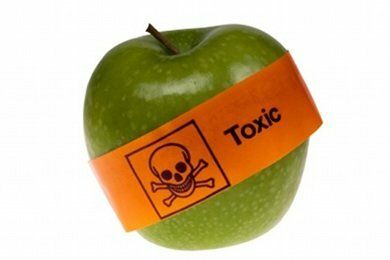Is Organic Produce More Nutritious Than Conventional Produce?
September 7, 2012 63 Comments
It is with great trepidation that I address the subject of “organic produce” on this site. Last time I wrote about it, there was a lot of controversy.

I am not a fan of controversy when it gets ugly - so I will ask you all to remain respectful of each other and me.
Stanford University scientists worked for four years with 237 studies comparing the nutritional benefit of organic versus conventional produce. Guess what they found?
They concluded that fruits and vegetables labeled organic were no more nutritious than their conventional counterparts. I found this result to be surprising as did the study authors. I thought that the use of organic fertilizer versus chemical fertilizer would have led to more nutrients in the food that the soil produced.
There was a study done in Washington state that found that organic strawberries contained more vitamin C than conventional ones. I wonder if lumping all the studies together for all the produce and meat may have just missed out on the benefits or organic for certain foods.
For example, I cannot imagine that the local organic corn that I buy could be comparable to the factory farms in Iowa that use large amounts of petroleum based fertilizer. I can tell you one thing - I have noticed that organic produce tastes better than conventional produce.
What I know for sure is that the Stanford result depresses me. I want organic produce to be the Superman of produce that will save the world from pesticides AND poor nutrition. If it had gone the other way, we could rise up and demand all of our food be organic and maybe the price would come down.
On the other hand, every day I make choices based on my budget about what foods I can buy. I did my own study about how much organic produce would cost me here: The Price of Organic. I found that my produce bill would be TWICE what it would have cost me if I just bought conventional produce.
My point has always been that the health benefits of a diet rich in fruits and vegetables outweigh the risks of pesticide exposure.
Do I want pesticides in my food? Of course not. But I’m not going to stop filling my shopping cart with fruits and veggies because I can’t afford organic produce.
I get e-mails from readers who feel guilty about not being able to buy organic produce. You know, I think you should be proud that you are buying produce!
Do you ever look at the shopping carts around the store? I do this and am always blown away by how little produce people are buying. Sometimes, I want to wear my cape to the store and just shake these people.
For some of you, the path to healthy does mean buying organic. For others, the journey is just about putting down the Snickers bar and picking up the apple.
Just keep picking up the apple and don’t let “organic” overwhelm you.
Please share your thoughts on organic versus conventional produce.
Other posts you might like:

How Important Is It To Buy Organic?
Snack Girl finally watched "Food, Inc." - and it made her think. She immediately wanted to go out and buy all her food at Whole Foods (where almost all of the produce is organic)....

Eat Your Fruit and Veg, Don't Avoid the "Dirty Dozen"
The Environmental Working Group (EWG) puts out a list every year to help guide shoppers on which produce to buy. Their "Dirty Dozen" is a list of produce that contains pesticide residues....

63 Comments:
Ashley
Jennie McKenna
Oom Muhammad
Andy D
Heather
CoachTod
Pat Adler
Jennifer @ Peanut Butter and Peppers
RC Liley
Jennifer
Martin
Barb
Zennifer
peggy
CeCe
LWB
Kim
Julie G
Mandy
Jeanne
Jessica, The Debt Princess
aew
Marie Cheek
lecyda
LisaFromOH
Viola
Caitlin
stu
Kim Seebach
Cristina @ An Organic Wife
Marcia
Nina
CJ
Emily
Brooke
jeramie
Lauren
Bridgette
Lourdes
Shari
stu
Margaret
pbfruit
Becky
Stacie
Eva
Brandi
Christine
Marjorie Stradinger
Trellia
Andy D
name
Anne
Kimberly Reid
k
Kathryn Barrett
Mikey
Tammy
Carla
Susan
Morgan
Catherine
Tanya